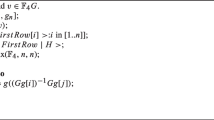Abstract
A code \({{\mathcal C}}\) is \({{{\mathbb Z}_2}{{\mathbb Z}_4}}\) -additive if the set of coordinates can be partitioned into two subsets X and Y such that the punctured code of \({{\mathcal C}}\) by deleting the coordinates outside X (respectively, Y) is a binary linear code (respectively, a quaternary linear code). In this paper \({{{\mathbb Z}_2}{{\mathbb Z}_4}}\) -additive codes are studied. Their corresponding binary images, via the Gray map, are \({{{\mathbb Z}_2}{{\mathbb Z}_4}}\) -linear codes, which seem to be a very distinguished class of binary group codes. As for binary and quaternary linear codes, for these codes the fundamental parameters are found and standard forms for generator and parity-check matrices are given. In order to do this, the appropriate concept of duality for \({{{\mathbb Z}_2}{{\mathbb Z}_4}}\) -additive codes is defined and the parameters of their dual codes are computed.
Similar content being viewed by others
References
Bierbrauer J.: Introduction to Coding Theory. Chapman & Hall/CRC, Boca Raton, FL (2005)
Borges J., Fernández C., Phelps K.T.: Quaternary Reed–Muller codes. IEEE Trans. Inform. Theory 51(7), 2686–2691 (2005)
Borges J., Fernández-Córdoba C., Phelps K.T.: ZRM codes. IEEE Trans. Inform. Theory 54(1), 380–386 (2008)
Borges J., Fernández C., Pujol J., Rifà J., Villanueva M.: On \({{{\mathbb Z}_2}{{\mathbb Z}_4}}\) -linear codes and duality. VJMDA, pp. 171–177, Ciencias, 23. Secr. Publ. Intercamb. Ed., Valladolid (2006).
Borges J., Fernández-Córdoba C., Pujol J., Rifà J., Villanueva M.: \({{{\mathbb Z}_2}{{\mathbb Z}_4}}\) -Additive Codes. A Magma Package. Autonomous University of Barcelona (UAB), Bellaterra, Barcelona (2007). http://www.ccg.uab.cat. Accessed July 2009.
Borges J., Fernández C., Rifà J.: Every \({{\mathbb Z}_{2k}}\) -code is a binary propelinear code. In: COMB’01. Electronic Notes in Discrete Mathematics, vol. 10, pp. 100–102. Elsevier Science, Amsterdam, November (2001).
Borges J., Phelps K.T., Rifà J.: The rank and kernel of extended 1-perfect \({{\mathbb Z}_4}\) -linear and additive non-\({{\mathbb Z}_4}\) -linear codes. IEEE Trans. Inform. Theory 49(8), 2028–2034 (2003)
Borges J., Rifà J.: A characterization of 1-perfect additive codes. IEEE Trans. Inform. Theory 45(5), 1688–1697 (1999)
Bosma W., Cannon J., Playoust C.: The MAGMA algebra system I: the user language. J. Symb. Comput. 24(3–4), 235–265 (1997)
Delsarte P.: An algebraic approach to the association schemes of coding theory. Philips Research Rep. Suppl. 10, vi + 97 (1973).
Delsarte P., Levenshtein V.: Association schemes and coding theory. IEEE Trans. Inform. Theory 44(6), 2477–2504 (1998)
Hammons A.R., Kumar P.V., Calderbank A.R., Sloane N.J.A., Solé P.: The \({{\mathbb Z}_4}\) -linearity of kerdock, preparata, goethals and related codes. IEEE Trans. Inform. Theory 40, 301–319 (1994)
Heden O.: A new construction of group and nongroup perfect codes. Inform. Control 34, 314–323 (1977)
Huffman W.C., Pless V.: Fundamentals of Error-Correcting Codes. Cambridge University Press, Cambridge (2003)
Krotov D.S.: \({{\mathbb Z}_4}\) -linear Hadamard and extended perfect codes. Electron. Notes Discrete Math. 6, 107–112 (2001)
Ledermann W.: Introduction to Group Characters. Cambridge University Press, Cambridge (1977)
Lindström B.: Group partitions and mixed perfect codes. Can. Math. Bull. 18, 57–60 (1975)
MacWilliams F.J., Sloane N.J.A.: The Theory of Error-Correcting Codes. North-Holland Publishing Company, Amsterdam, New York, Oxford (1977)
Phelps K.T., Rifà J., Villanueva M.: On the additive (\({{\mathbb Z}_4}\) -linear and non-\({{\mathbb Z}_4}\) -linear) Hadamard codes: Rank and Kernel. IEEE Trans. Inform. Theory 52(1), 316–319 (2006)
Pujol J., Rifà J.: Translation invariant propelinear codes. IEEE Trans. Inform. Theory 43, 590–598 (1997)
Pujol J., Rifà J., Solov’eva F.: Construction of \({{\mathbb Z}_4}\) -linear Reed–Muller codes. IEEE Trans. Inform. Theory 55(1), 99–104 (2009)
Rifà J., Basart J.M., Huguet L.: On completely regular propelinear codes. In: Proceedings of 6th International Conference, AAECC-6. LNCS, vol. 357, pp. 341–355. Springer, Berlin (1989).
Rifa J., Phelps K.T.: On binary 1-perfect additive codes: some structural properties. IEEE Trans. Inform. Theory 48(9), 2587–2592 (2002)
Author information
Authors and Affiliations
Corresponding author
Additional information
Communicated by T. Helleseth.
Rights and permissions
About this article
Cite this article
Borges, J., Fernández-Córdoba, C., Pujol, J. et al. \({{{\mathbb Z}_2}{{\mathbb Z}_4}}\) -linear codes: generator matrices and duality. Des. Codes Cryptogr. 54, 167–179 (2010). https://doi.org/10.1007/s10623-009-9316-9
Received:
Revised:
Accepted:
Published:
Issue Date:
DOI: https://doi.org/10.1007/s10623-009-9316-9
Keywords
- Binary linear codes
- Duality
- Quaternary linear codes
- \({{{\mathbb Z}_2}{{\mathbb Z}_4}}\) -additive codes
- \({{{\mathbb Z}_2}{{\mathbb Z}_4}}\) -linear codes



